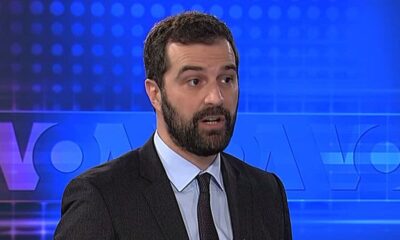Politics
Freelancer Loses Client Over Political Views, Sparking Debate

When freelance organic marketer Melissa Zehner lost a long-term client, she expected feedback on her work performance. Instead, she received a politically charged dismissal. The client criticized her for her Democratic views, labeling them as “narrow and demented,” and accused her of being “not loyal to the country.” This incident highlights the growing impact of political polarization in American workplaces, particularly for freelancers who lack the legal protections afforded to traditional employees.
Zehner’s LinkedIn posts advocating for issues such as equal rights and affordable healthcare played a role in the termination of her contract. In a statement reflecting her frustration, she noted, “I’m gonna talk about it, because the US is becoming more polarised every day.” This sentiment resonates across various workplaces, where political tensions have reached crisis levels, affecting both employees and independent contractors.
The Society for Human Resource Management (SHRM) conducted a study revealing that 56% of US workers who experienced workplace incivility cited political differences as the cause. The organization estimates that these conflicts cost businesses approximately $2 billion per day in lost productivity, translating to about 190 million hostile exchanges daily. Additionally, research by Owl Labs found that 45% of workers avoid the office due to colleagues’ political opinions, with 26% reporting differential treatment based on political beliefs—a stark increase from just 11% in 2019.
Zehner’s situation underscores the vulnerabilities of independent contractors. Under US federal law, freelancers are not protected by Title VII of the Civil Rights Act of 1964, which prohibits discrimination based on race, sex, age, or religion. Political affiliation, however, is not included. In many states, private-sector workers can be dismissed for their political expression. Although states like California and New York have protections for employees’ off-duty political activity, these safeguards rarely extend to freelancers. This legal gap leaves millions of gig workers—nearly 64 million Americans, according to Upwork’s 2024 survey—exposed to potential retaliation for their personal beliefs.
Zehner’s case is particularly noteworthy because her political opinions were expressed outside of her work hours and were unrelated to her professional responsibilities. Her advocacy for equal rights and safe schools was communicated on her personal LinkedIn account. Yet, these views were sufficient to sever her professional relationship.
Experts in human resources recommend that professionals navigate political differences carefully. SHRM advises keeping discussions factual and brief while redirecting conversations that become hostile. Employers are encouraged to focus on the impact of political disputes on productivity rather than on ideology.
For freelancers, legal advisors suggest incorporating non-discrimination and early termination clauses in contracts to protect payment rights if a project ends due to personal views. Maintaining documented records of communications and deliverables can also bolster a freelancer’s position in disputes. HR consultant Kelly McCown noted that “the best defence for contractors is a strong contract and consistent professionalism—not silence.”
As the clash between personal expression and professional relationships intensifies, especially in an election-charged atmosphere, Zehner remains resolute. She stated, “I’m not going to pretend to be someone I’m not to win a client. Full stop.” Her experience reflects a troubling reality in America’s freelance economy: freedom of speech often ends where a client’s discomfort begins.
Zehner’s story resonates in various comment threads on LinkedIn, indicating a broader concern about the implications of political polarization in the workplace. The ongoing debate challenges both freelancers and employers to find a balance between personal beliefs and professional obligations in an increasingly divided landscape.
-

 World2 weeks ago
World2 weeks agoCoronation Street’s Shocking Murder Twist Reveals Family Secrets
-

 Entertainment1 week ago
Entertainment1 week agoAndrew Pierce Confirms Departure from ITV’s Good Morning Britain
-

 Entertainment5 months ago
Entertainment5 months agoKate Garraway Sells £2 Million Home Amid Financial Struggles
-

 Entertainment4 months ago
Entertainment4 months agoAnn Ming Reflects on ITV’s ‘I Fought the Law’ Drama
-

 Entertainment1 month ago
Entertainment1 month agoCoronation Street Fans React as Todd Faces Heartbreaking Choice
-

 Health4 months ago
Health4 months agoKatie Price Faces New Health Concerns After Cancer Symptoms Resurface
-

 World1 month ago
World1 month agoBailey Announces Heartbreaking Split from Rebecca After Reunion
-

 Entertainment2 weeks ago
Entertainment2 weeks agoTwo Stars Evicted from I’m A Celebrity Just Days Before Finale
-

 Entertainment4 months ago
Entertainment4 months agoCoronation Street’s Carl Webster Faces Trouble with New Affairs
-

 World2 weeks ago
World2 weeks agoKevin Sinfield Exceeds Fundraising Goal Ahead of Final Marathons
-

 Entertainment4 months ago
Entertainment4 months agoWhere is Tinder Swindler Simon Leviev? Latest Updates Revealed
-

 Entertainment5 months ago
Entertainment5 months agoMarkiplier Addresses AI Controversy During Livestream Response




















